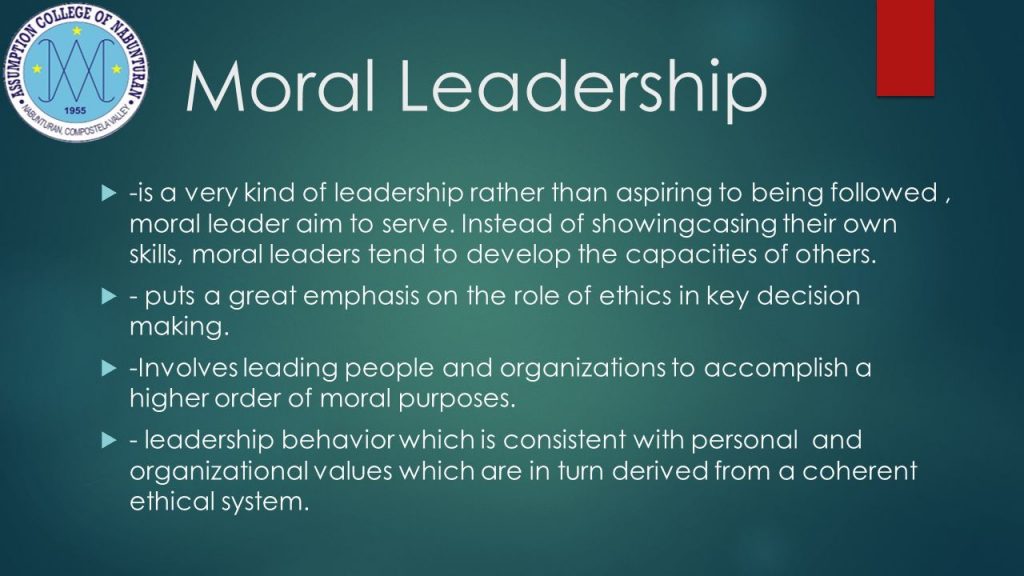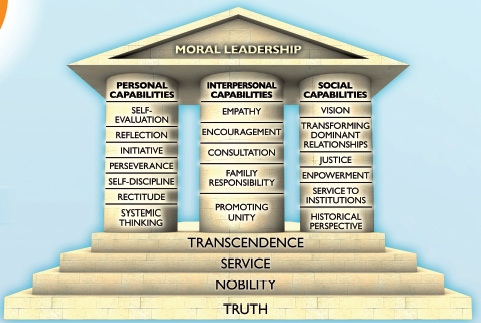Moral Leadership
Leadership is all about responsibilities, while morality entails instilling values for individuals to live and abide by. Moral leadership inspires and motivates people to act and hold themselves accountable. When you see people fail to step up and provide purpose or even do something that can give goodness to a more significant number of people, step up. Moral leadership is subject to respect for ethical beliefs and values to preserve human dignity and their respective rights (Ciulla, 2014). When discussing moral leadership, one must remember concepts such as honesty, integrity, trust, fairness, charisma, and consideration. Ethical governance is primal to building trust, inspiring colleagues, creating meaning, or helping individuals imagine a better future. It enables people always to do the next right things. This paper aims to enhance our awareness of moral leadership, what it entails, and various ethical leadership concepts.
World leaders are often celebrated based on their achievements and bravery. However, when it comes to moral leadership, the ideas seem far-fetched. As such, it comes down to whether morality counts when it comes to matters about administration? Numerous studies have concluded that moral leaders are better equipped to execute their obligations than their amoral counterparts (Lemoine, Hartnell, & Leroy, 2019). People seldomly celebrate ethical leaders in the current world. Perhaps, most people are accustomed to celebrating the wrong category of individuals. Great leaders, may it be in organizations or countries, will always work hard to ensure that morality permeates all aspects of their governance. A strategic initiative is imperative or rather subject to the ethical and effective management of projects. It is always hard to make a proper decision as every moral dilemma is subject to a solution. The success of institutions is entirely dependent on a decision-making process that involves moral dimension, ethics, and good governance. Three forms of moral leaders often overlap, namely, ethical, servant, and honest.
Ethical leaders tend always to refer and adhere to norms and regulations. They reciprocate the prevailing institution norms, standards, and culture to enact adherence to those standards among the individuals under their leadership. An ethical leader represents a moral role model and suppresses activities aiming to promote corruption in an institution, such as bribery and compromising classified information (Hannah, Avolio & Walumbwa, 2011). This form of leadership demands spearheading individuals into attending their respective obligations to avoid scandals, lawsuits, bad public image, and embarrassing the institution. It is expected that this form of leadership to a formidable bond that leads to mitigating harassment as people are always acting in the right way. The wrong side is that ethical leaders may enact self-gains regulations that other people might regard as offensive and immoral. For example, the United States may take an opportunity to financially aid third-world countries’ economies that work for better living standards. However, it would frown upon the Americans. Such actions are justifiable by ethical leaders based on their moral appropriateness by that country’s means but would hold less meaning when it comes down to the United States citizens.
Servants leaders tend to be so much inclined to outcomes. Servant leaders concentrate on how others get helped or harmed by their acts and often tend to spearhead institutions to perform better in the best interests of the public wellness (Lemoine, Hartnell, & Leroy, 2019). Servant leaders serve to take care of people. When it comes to business organizations, servant leaders put their employees into consideration first while at the same time looking out for other stakeholders, such as clients, shareholders, surrounding communities, vendors, among others. When it comes to the nation’s servant leaders, they will always put the interest of their people first and, at the same time, consider others. Servant leadership often faces the dilemma of balancing all the stakeholders involved in their governance. When it comes to economists, the vast majority of them would argue that any wealth spent on corporate social responsibility, ensuring the world’s wellness, is inversely suppressing the shareholders’ and employees’ returns.
Authentic leadership is often intertwined with fairness, honesty, and wisdom. Authentic leaders are highly aware of their strengths and weaknesses and always work hard to improve the people they lead by helping them understand themselves (Lemoine, Hartnell, & Leroy, 2019). Their decision-making process is subject to their moral compass, instead of other people’s opinions of morality. Authentic leaders listen to other people’s views, but ultimately, they would not primarily adhere to rules, or people’s expectations, or even what the majority would applause (Caza & Jackson, 2011). An authentic leader is a leader who can display moral courage to execute what they feel is right. They set an example for others to follow and encourage them to always be the best version of themselves. In most practical terms, think of organization leaders who, as soon as they assume power, overhaul everything and do what they feel is right. Such leaders can do unexpected things on some occasions, at times, go contrary to the rules, and sometimes it may have appeared as if they were doing something against the stakeholders involved in the short term. However, that felt right to them.
Authentic leadership is often associated with uncertainty, following internal drives that are only predetermined and only known (Lemoine, Hartnell, & Leroy, 2019). Individuals who follow a contrary moral compass to authentic leaders can write off such leadership as a loose cannon.
It is practical for leaders to have more than one element of ethical leadership. It may not be mutually exclusive to employ the above three moral leadership forms. Correspondingly, leaders may consider utilizing different moral leadership forms as significant based on present situations, as per the need dictation. The vast majority of the people make the mistake of categorizing themselves as virtuous and often try to generalize that other individuals hold a similar opinion than they do. It is a prerequisite for leaders of institutions to acknowledge that what they perceive as morally righteous may have a different interpretation of other people under their leadership. For instance, a chief executive officer of a given organization may practice an ethical leadership style; however, employees may be morally inclined toward a servant or authentic leadership. As such, one has to match the people’s morality under his/her supervision to achieve your goals effectively. People may support your idea of being an ethical leader, but you are the only one to give or rather determine what that entails.








